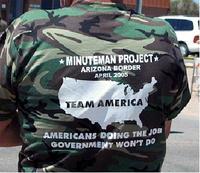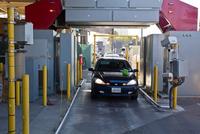-
1.6%: CBP data show dysfunctional Internal Affairs
The good news is that James F. Tomscheck, the head of internal affairs for U.S. Customs and Border Patrol since 2006, was reassigned last week to another job within his agency. The bad news is that CBP internal affairs supports a decades-old culture mired in cronyism and secrecy. Last month, for example, CBP finally disclose data about internal affairs investigations into allegations of abuse by its own agents. Even so, the numbers are so out of whack that this federal report easily might be confused with the Chinese government’s recent version of the violence at Tiananmen Square in 1989: out of 809 complaints of abuse by CBP agents from January of 2009 to January of 2012, only an astounding thirteen required disciplinary action against CBP agents. The public is supposed to believe, in other words, that under Tomscheck’s leadership, a mere 1.6 percent of the charges against his agents over a three-year period had merit.
-
-
Sharp increase in the number of unaccompanied children crossing into U.S.

DHS’ Office of Immigration Statisticsreports that U.S. Border Patrolagents apprehended 30,000 children traveling alone illegally across the Mexican border in 2013. The Border Patrol expects to arrest as many as 90,000 children this year, and about 142,000 children in 2015. The Office of Management and Budgethas notified the Senate Appropriations Committeethat the increase in the number of children crossing the border alone would cost the government at least $2.28 billion, about $1.4 billion more than the Obama administration had budgeted for in its Unaccompanied Alien Childrenprogram.
-
-
DHS revises rules for use of deadly force on border

On 30 May DHS released new guidelines detailing when the use of force by Border Patrol officials is authorized. The lack of explicit scenarios within the rules, however, has led to questions of when such acts are truly warranted.
-
-
Lawmakers criticize DHS’s spending on border security projects
Lawmakers last week raised concerns about what they described as DHS undisciplined spending on various birder security projects. The hearing was held a week after the Government Accountability Office (GAO) issued a report citing DHS as a “high risk” for government waste. The DHS Acquisition Accountability and Efficiency Act, which aims to improve the department’s discipline, accountability, and transparency in acquisition program management, will be considered by the full House after the Committee on Homeland Security gave its recommendation to the act last week.
-
-
Records show Border Patrol agents typically not disciplined for abusing immigrants
Records obtained through a Freedom of Information Act request by the American Immigration Council(AIC) found that of 809 abuse complaints reported to the Border Patrol’s internal affairs unit between January 2009 and January 2012, only thirteen led to disciplinary action, and most of the agents cited for disciplinary action were only ordered to undergo counseling. One expert on unauthorized migration says that Border Patrol agents are not properly trained or disciplined by the agency.”People are not being held accountable for their actions,” he said. He conducted a survey in which he found that 10 percent of migrants reported abuse by Border Patrol agents when they were found illegally crossing the border.
-
-
The influence of the Minutemen Project and similar groups has diminished

The Minuteman Project and like-minded groups tried to make their own contribution to stopping illegal immigration by positioning their members across the U.S.-Mexico border, equipped with binoculars, American flags, and sometimes guns. Dwindling financial resources and publicized personal troubles of some of the group’s leaders have diminished the group’s ability to maintain a presence along the Southwest border. Observers say that the project represents the past in the debate over illegal immigration.
-
-
Violence and corruption by drug cartels hits homeland
While the American media devotes much time and effort to pinpointing the violence and corruption generated by the drug cartels in Mexico, far less attention is devoted to crimes in this country which are a direct result of these same criminal organizations. The corruption of American law enforcement has become a significant problem along the border. The Mexican drug cartels which control drugs and human smuggling are directly responsible for a spiraling level of violence and crime which instills fear among residents on both sides of the border even as it lowers the quality of life for all who call the U.S.-Mexican borderlands their home.
-
-
New detection technology to help combat nuclear trafficking
According to the International Atomic Energy Agency (IAEA), the greatest danger to nuclear security comes from terrorists acquiring sufficient quantities of plutonium or highly enriched uranium (HEU) to construct a crude nuclear explosive device. The IAEA also notes that most cases of illicit nuclear trafficking have involved gram-level quantities, which can be challenging to detect with most inspection methods. Special algorithm coupled with commercial X-ray scanners allows detection of small amounts of fissile materials in luggage.
-
-
U.S.-Mexico border security barriers affect movement of animals
Security barriers in national parks on the U.S.-Mexican border which aim to deter illegal migrants are affecting the movements of some native animal species while not necessarily restricting the movement of humans, according to new research.
-
-
CBP takes another stab at high-tech border security

The George W. Bush administration’s effort to build a high-tech border security system – the Boeing-led SBINet – was a failure, and the Obama administration shut it down in 2011. CBP is now trying again, this time with Elbit Systems as the lead contractor. The hope is that the lessons of the doomed SBINet, and Elbit’s experience in building high-tech defensive systems along Israel’s borders, would yield better result this time around.
-
-
Passports of millions of travelers to U.K. not thoroughly checked
The use of false passports by two passengers on Malaysia Airlines flight MH370 which disappeared a couple of days ago have highlighted the fact that in the United Kingdom, the passport details of more than twenty million people entering and leaving the United Kingdom every year are not being properly checked. The Home Office’s most recent figures show that data is still not being collected and examined for about 10 percent of the 200 million people flying in and out of the United Kingdom every year.
-
-
CBP awards $145 million border towers contract to Elbit
DHS’s Customs and Border Protection(CBP) has awarded Elbit Systems of America, a subsidiary of Israeli based Elbit Systems, a $145 million contract for the Integrated Fixed Tower (IFT) project along the Mexico-Arizona border. The first phase of the project includes a number of observation towers along the Nogales, Arizona border with Mexico. Additional options could include towers at over five other border sections in Arizona.
-
-
Two politicians insisting on more congressional oversight of DHS
The lawmakers who support the proposed DHS Acquisition Accountability and Efficiency Act, authored by Representative Jeff Duncan (R-South Carolina), are doing exactly what they were sent to Washington to do: they are attempting to provide fiscal oversight over one of our largest federal agencies. Hopefully, politicians on both sides of the aisle will join Representatives Duncan and Michael McCaul (R-Texas) in passing legislation forcing DHS to use tax payer money in the most efficient ways possible, including demanding contractors meet the terms of their contracts, not rewarding contractors who have a record of poor performance, and completing their security-related projects in a timely manner.
-
-
Robots help Border Patrol navigate smugglers’ tunnels
The U.S. Border Patrol is using remote- controlled robots to navigate tunnels used by drug cartels and smugglers to import drugs, weapons, and people from Mexico into the United States.The robots are used as the first eyes on places deemed too dangerous for humans to explore.
-
-
French anti-Semitic entertainer banned from U.K.

The United Kingdom has banned the anti-Semitic French comedian Dieudonné M’bala M’bala from entering the country. Dieudonné was planning to go to Britain to offer support to Nicolas Anelka, the French 34-year old forward who plays for the West Brom Albion soccer club. On 28 December, Anelka celebrated a goal he scored against West Ham by performing the “quenelle” – an inverted Nazi salute popularized by Dieudonné. Owing to its creator and what he says about Jews and his mocking of the Holocaust, the quenelle carries an unmistakably anti-Semitic message, although some of those who performed it in public argue they were under the impression it was merely and anti-establishment and anti-system gesture.
-
- All
- Regional
- Water
- Biometrics
- Borders/Immig
- Business
- Cybersecurity
- Detection
- Disasters
- Government
- Infrastructure
- International
- Public health
- Public Safety
- Communication interoperabillity
- Emergency services
- Emergency medical services
- Fire
- First response
- IEDs
- Law Enforcement
- Law Enforcement Technology
- Military technology
- Nonlethal weapons
- Nuclear weapons
- Personal protection equipment
- Police
- Notification /alert systems
- Situational awareness
- Weapons systems
- Sci-Tech
- Sector Reports
- Surveillance
- Transportation
Advertising & Marketing: advertise@newswirepubs.com
Editorial: editor@newswirepubs.com
General: info@newswirepubs.com
2010-2011 © News Wire Publications, LLC News Wire Publications, LLC
220 Old Country Road | Suite 200 | Mineola | New York | 11501
Permissions and Policies
Editorial: editor@newswirepubs.com
General: info@newswirepubs.com
2010-2011 © News Wire Publications, LLC News Wire Publications, LLC
220 Old Country Road | Suite 200 | Mineola | New York | 11501
Permissions and Policies
